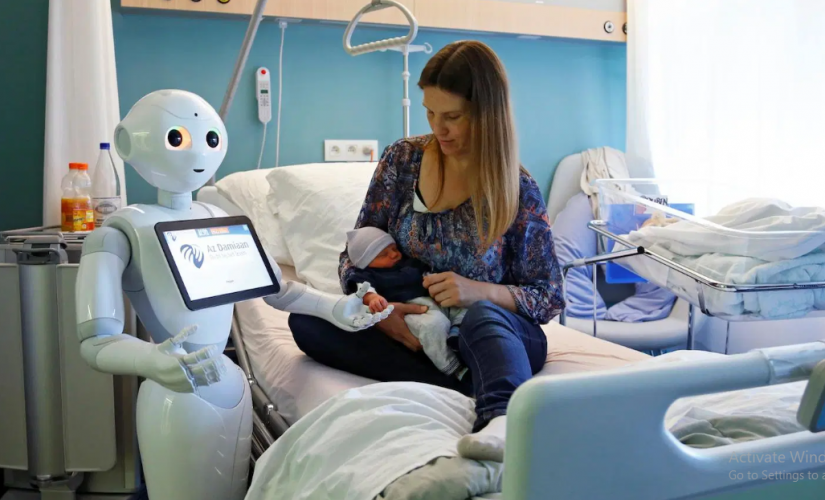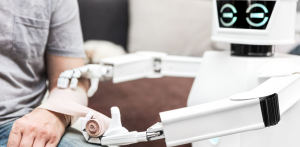Can Artificial Intelligence Replace the Role of Doctors?
Can Artificial Intelligence Replace the Role of Doctors?

The development of Artificial Intelligence (AI) technology has increased rapidly. Not only does it play a role in the field of entertainment and communication, but the future traces of AI in the area of health and life begin to be seen. In some countries, AI is integrated into sophisticated analytical tools to help doctors in hospitals diagnose cancer and other diseases. But can artificial intelligence replace the role of doctors?
Can AI make a significant contribution and push development in the health sector?
Through the application, AI automatically helps patients diagnose disease complaints online before visiting the doctor. How you do it The AI algorithm has the function of understanding the disease pattern and deciphering the device data and then reporting the health problems to the patients and private doctors.
It is expected that in the next five to seven years, the proliferation of new AI technology companies will become an essential element to help medical professionals save lives. AI may be present in the operating room, providing clinical laboratory services to detect sources of disease with a “force” that had never existed before.
What is the potential of AI in the sector of health worldwide?
Global Market Insights research shows that AI market revenues in the US are expected. UU. In the field of medical care exceeding the US $ 4 billion in 2024, this figure has increased by 38% since 2016 to around $ 320 million.
Research also shows that in the same period, the revenues of the AI market in Europe are projected to reach around $ 3.8 billion. The company’s global AI market revenue will also exceed $ 10 billion in 2024.
The use of AI-controlled robots does not completely replace the role of medical personnel.
AI-controlled robots can increase the role of doctors, surgeons, or nurses. In a Forbes report, Brian Kalis, managing director of digital health and innovation at Accenture, said AI would be widely used in US hospitals. Over the next five years. “AI reduces the complications and errors that can occur during surgery and makes the hospital stay shorter,” Kalis said.
His company also estimates that the use of such robots will generate $ 40 billion annually for the US healthcare industry in 2026. “This will contribute a lot to the projected value,” he added.
Interestingly, McKinsey’s research mentioned that integrating medical AI devices into the patient care workflow would increase nurse productivity by 30% and 50%.
China’s health sector, including those that are quickly becoming fashionable and wish to adopt AI.
A recent Forrester investigation said that up to 20% of significant health industry organizations in China intend to adopt intelligent nursing technology, and 17% will adopt medical robots in the next three years.
AI technology also contributes to the diagnosis and early detection of the disease. Artificial intelligence can help reveal details of magnetic resonance imaging (MRI) and other scanning machines. Researchers at the University of Lehigh in the state of Pennsylvania, USA.
For example, recently developed AI-based disease detection techniques. These innovations offer greater accuracy and detection efficiency and can be used at a relatively low cost in developing countries with the highest risk of disease.
Increased concerns about AI.

The ability of AI to support various aspects of the health sector becomes a major leap that can produce prevention strategies and treatment approaches that are much more efficient and effective, including reducing the cost of medical care. Even so, some doctors believe that although AI can do a variety of things, AI cannot assume the role of human interaction.
“Health and medical care are too human for AI to be treated,” said Rasu Shrestha, head of the innovation section of the University of Pittsburgh Medical Center and head of the radiology and computer science division.
According to him, radiology became a specialization that AI would be interrupted for the first time if it was really applied. Will the medical school stop training radiologists later? “AI algorithms may be diagnostic experts, but AI cannot replace the role of doctors in decision making.”
Another concern arises because most doctors do not realize that the use of AI used in clinics has an impact beyond research.
The health system needs to find ways to protect patient privacy and protect themselves from liability. What happens if AI is wrong?
In addition to the negative support or feeling, in reality, the application of technology in the health sector has not been able to completely replace the role of medical personnel. Hopefully, the development of AI in the health sector can help more people deal with various health problems.
Utilization of Artificial Intelligence (AI) in the Health Sector
In the current era, the role of technology is very important. Technology plays a role and aims to make human work easier and more efficient.
Even in the health sector, technology plays an important role in minimizing errors caused by human negligence.
For example, if technology does not play a role in surgical operations performed by doctors, the operation can be dangerous and prone to failure.
Artificial Intelligence can be interpreted as technology or machine that has intelligence like humans or, in other words, AI is a simulation of artificial intelligence on machines that are programmed to think like humans.
Artificial intelligence technology that we often hear in smartphone camera technology to improve the results of our selfies. But, did we know that this technology is made and also used in many fields? From the fields of economics, education, defense/military, health, etc.
In the field of health, AI itself is used in many ways, which is undoubtedly minimizing the occurrence of errors and making things more efficient.
1) Robotic surgery
Robots that have been equipped with artificial intelligence technology can analyze someone’s messy record data before performing the operation. The robot will guide and direct the surgeon during the operation process.
The use of this robot can also produce new surgical techniques through data from previous operations to accelerate and simplify the operation process.
2) Virtual nurse
This virtual nurse has been developed by several companies and new companies. An example is Molly, developed by Sense. This virtual nurse serves to help nurses monitor and track the patient’s condition.
3) Creation of new drugs.
To develop a medication, you must go through clinical trials that sometimes take a long time and cost a lot. However, an AI-compatible program will make this process faster. AI is used to scan existing medications that can be redesigned to fight disease.
The use of the AI program has only found two medications that can reduce Ebola infectivity in just one day.
4) Predict early cancer and Back Pain
The use of AI to predict cancer patients is to obtain information in a person’s DNA. AI will perform a body scan to detect cancers and diseases that someone may face based on their genetics.
AI programmed computer use to deduct lower back pain or Sciatica pain issues and also suggest advice to the patient like usage of best office chair for back pain, take a massage, exercises and Yoga tips.
5) Health monitoring
Health monitoring with AI technology can be seen in the technology applied to Smartwatch, where this smartwatch can monitor the heart rate and activity level of the user. A smartwatch can record user habits information that can be a source of data for doctors if the user is sick.
The post Can Artificial Intelligence Replace the Role of Doctors? appeared first on ReadWrite.
(39)

